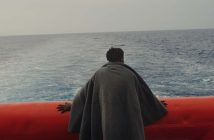We are here in Cannes; the film has been presented, but the awards not yet announced. What’s your impression after these intense few days?
I shall focus on just the wonderful things that have happened here. At the end of the official screening, the audience was on its feet; they gave us a nearly fifteen-minute standing ovation. The actors couldn’t stop crying. On one television programme, a critic publicly said that Youssouf Djaoro was one of the three names circulating for the Best Actor Award
Moreover, the film has received a great critical reception. What more could we ask for!
There is nonetheless an ambiguity between African and Chadian cinema. With the first film from sub-Saharan Africa in the official selection for thirteen years, you inevitably represent the continent.
Absolutely; that’s the buzz that the media creates, the Cannes thing. They have to find a label to present a film. I’m not the ambassador of African film. That would distort the picture and judgements. If the film is good, are people going to deduce that all African films are good? And if it’s bad, will they deduce that there is no hope for African cinema? It’s a fact that there are only a handful of quality auteurs in Africa. Each has his/her own universe, sensibility, well-identified approach and specific cinematic style. Each is like a star in the desert. Each bears his/her own world, with his/her own history, culture, past, and when I say « history », I mean the family, personal, intimate history that differentiates us. Even when you belong to the same family, you don’t share the same experiences, you don’t experiment the same things. It is thus better to consider this film as a film by Haroun and to judge it as such, without taking it to be « the » sub-Saharan African film.
Back in Chad, your reception of international awards has helped advance things, and the Cinéma Normandie is now being renovated.
Yes, I have always positioned myself against certain filmmakers and institutions that only wanted to produce local and see local. We have to set our sights high, target the whole planet, in order to be recognized back home. This awareness in Chad has been developing since Daratt. And now that A Screaming Man is at Cannes, I have received a whole host of messages from officials who are giving this medium greater importance. Local films that do not represent the country in the world at large have no incidence on the politicians. We have to set our sights high so that the ball bounces back home and provokes reactions and policies in favour of film.
The Chadian government has invested directly this cinema’s renovation?
Absolutely. It was the President himself who decided to put 1.5 million euros into the operation. A piece of good news from Chad, at a time when everywhere else cinemas are closing! When we were shooting A Screaming Man, I went to visit this cinema, in the middle of the renovation work. A new geography of African cinema is thus emerging. I would like other countries to follow this example. We will only succeed in developing our cinema if the political authorities tackle the question head-on. We mustn’t forget that the football teams that reach the final rounds are not poor teams: it’s because Nigeria invests that its team gets so far! Cinema is also a question of political will and means.
In your film, like Abderrahmane Sissako before you, you cite Césaire. Césaire is a radical reference in the denunciation of the gaze directed at Africans. This is clearly at the heart of your discourse.
Yes. It must not be forgotten that the original fault comes from the fact that Africa was first of all filmed by others. This representation is so distorted that our cinema is inscribed in challenging of this vision. Césaire is the central icon: he is an inexhaustible inspiration. Today we are in a battle of images in which Africans have to find their place and impose a different representation of Africa in the world. When I travel, I meet people everywhere who have an idea of Africa without ever having been there. It’s important that we give a representation of our continent, one which is the most just possible.
It is interesting to hear you reiterate the same thing that Souleymane Cisse said to Rithy Panh a long time ago now. It’s as if things refuse to change.
They will only change if our presence becomes commonplace. As our production is limited, expectations are very high. We need to put things in perspective. Imagine if A Screaming Man came after several African films each year; the context would be completely different. But here I am after thirteen years without a single Africa film in competition. Everybody’s wondering where this Chadian oddity has popped out from. Is it in its rightful place here, etc?
There are still people who have a paternalistic vision; hence this collection people are calling « African documentaries », films labelled as if they were a genre unto themselves
Do you think it’s a debate that constantly needs reviving, it being so necessary to remain vigilant?
Yes, it’s necessary to keep constantly correcting. We are forced to repeat what Sembene was saying in the Seventies. I would really like to break away from this repetition and devote myself to cinema, to making films that put Africa back at the centre, so as not to develop a culture of the periphery. We need to reach out to the whole world and refuse these spaces that are ethnically devoted to African film and which end up becoming ghettos. We need to advance in the open and confront our gaze with what is being made elsewhere.
This question of origins brings us back to the film. In Daratt, the characters had Chadian names: Atim, Nassara, etc. In A Screaming Man, they are called Adam, Abdel, David, Mariam
names that evoke certain connotations.
Yes, this is important, even if they are very common names in Chad. They give the film a mythological consonance. Without wanting to overdo the comparison, Shakespeare gave us Hamlet. The art of narrative is to propose characters that become so strong that we believe they really existed. It seems to me in Africa that we need narratives that border on myth. We aren’t inventing anything new, but we have a touch to add to the ton of films that have already been made. Moreover, those who are familiar with the revealed religions understand this reference and it adds to their understanding of the film.
Speaking of Adam, Youssouf Djaoro gives his role an impressive presence, despite the very few dialogues. You have pretty radical actor directing techniques. In Daratt, you wouldn’t let Ali Bacha Barkaï and Youssouf Djaoro speak at the end of the day’s shoot to maintain the tension between them. For A Screaming Man, you only gave the actors their own texts so they would be constantly surprised.
We endlessly have to fight against all the clichés heaped on Africa. People often say African actors are no good. I remember a FESPACO press conference in Paris where one African guy protested: « African filmmakers are no good at directing actors ». How can we put an end to such nonsense? I wanted to prove that in Chad, which is not a country of cinema, an actor I had noticed in Issa Serge Coelo’s film Daresalam had a presence that was both intelligent and instinctive. Working with him, we were able to create something.
We could compare the precision of your work with the actors to that of the soundtrack. Not only is Wasis Diop’s music magnificent, but the permanent echoes of the war are extremely incisive, forming a narrative that adds another layer to the main narrative.
It is war as experienced by ordinary people: trapped in their homes in confined spaces, unable to go out, and only receiving news of the war through distant sounds – explosions, planes, helicopters, vehicles – and on the radio, where the war of the airwaves is played out. One side says it’s won the battle, the other denies it; it’s completely absurd. I constructed a kind of sound narrative with Julie Brenta, the sound editor, which adds to the visual narrative. It’s the first time I have done this, to give the complete dimension of this tragedy.
It really grabs the spectator and ultimately reinforces the ambivalence of the character, Adam.
Yes, I wouldn’t wish for anyone to get caught up in these perfectly immoral civil wars in Africa, where anything goes, be it child-soldiers or whatever. Everything takes place on a level of feeling, and no one can measure another person’s fear. In these situations, I have seen people completely lose their grip, like the District Chief and his diarrhoea. Everyone reacts differently in the face such adversity. Adam loses his self-control and commits a fault; he loses his head. What I like in the distance that develops between Adam and the spectator is this permanent zone in which it is possible to question rather than judge. We are faced with a character who commits an unpardonable act, but it’s difficult actually to condemn him. But through Adam and his odious act, I wanted more generally to address the responsibility of fathers in Africa, and the future of the youth. When I see a child playing up in the street in Africa, I will tell him to stop because, as an adult, I consider myself responsible for him. So, if there are child-soldiers in Africa, it’s because they’ve been sent to war by adults, who are potentially fathers or uncles
You thereby come back to one of the essential functions of cinema, which is to turn fear into courage.
Absolutely. It’s very important: how to transform this fear, this threat of war that was omnipresent when we were shooting – the rebels were on the verge of entering the town at any moment – into courage. The artist’s role is to take life’s handicaps to express a country’s state of mind. The example of Staff Benda Billili, a group of paraplegic musicians from Kinshasa portrayed in a documentary shown in the Cannes Directors’ Fortnight, is exemplary; they have invented their own economy to invent their survival.
The title brings to mind not only Césaire, but also Jean-Marc Ela’s book African Cry. There is a need to tell the world today that there is somebody whose cry we are not hearing
Yes, this cry is so unheard that I for one believe that even crying is pointless. Hence Adam’s drama. There are a lot of things in the title. It’s a cry in the face of God’s silence, before others, before one’s entourage; this lack of attentive affection to other’s lives. There is more and more selfishness and this selfishness tends to forget Africa. The more Africa is forgotten, the more we need to bring it to the world’s attention. That’s what I am trying to do.
You insist several times in the film on not taking God to be the solution, or in other words, not slipping into passivity.
That’s right. It’s terrible to see that there are more and more churches and mosques in Africa because political solutions are lacking. People take refuge in religion, as if tomorrow will come down from the skies. For me, this belief reflects a complete loss of hope. I would like us to progress in the idea that life on earth consists in creating with one’s own two hands and thus giving one’s life meaning, even if life is hard. Having children is a means: a lineage is one way of giving one’s life meaning. I drive this point home because I would like people to go from religion to a little more philosophy. What’s tragic is that beliefs remain very rudimentary, often obscurantist, which worries me for Africa. As far as I see it, religion should encourage people towards the light.
The film’s moral force is impressive. And at the same time, it’s maybe your most humoristic film, with humoristic details even found in the final shot where Adam is still wearing his diving mask in guise of motorbike goggles. It’s very Hitchcockian.
It’s indeed thus that one reinforces the drama. Prosaic details make the person more amusing. His tragedy is all the more moving because he is comical. I worked on these details and I am Hitchcockian. That doesn’t necessarily mean I play on suspense. I did in Daratt, but I have the right to do chronicles, without developing the tension.
But in this film, the tension is present.
Yes, but it’s a film in movement; it is very different to Daratt, which is set behind closed doors.
You have said elsewhere that one film bears the seeds of another. What movement are you in today?
I am on transversal routes. I am working on a film project that will be set in Dakar, which is therefore very different to what I’ve made so far, but I like changes in direction; they help you renew yourself and take risks and experiment ways of directing and telling stories. It’s a documentary.
Digressions.
Yes, digressions. I’m also working on African Fiasco, a sort of political thriller, in which I will stay in the political realm.










